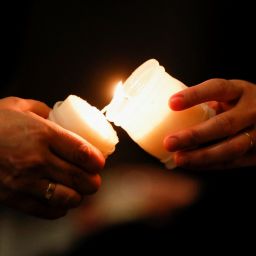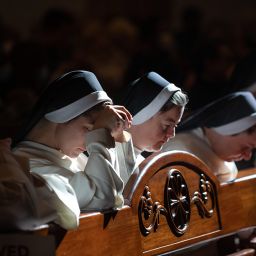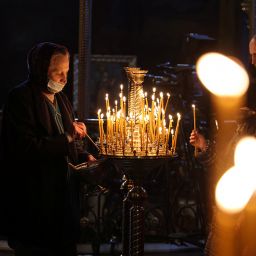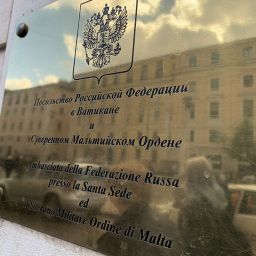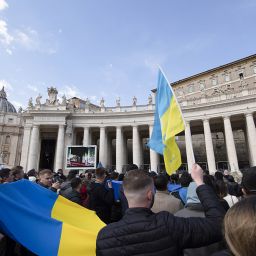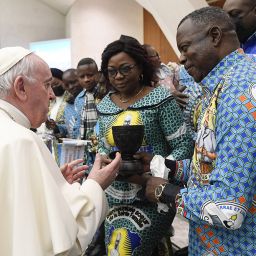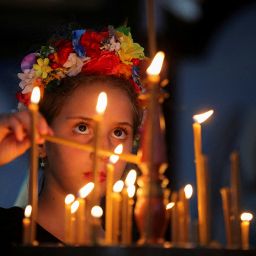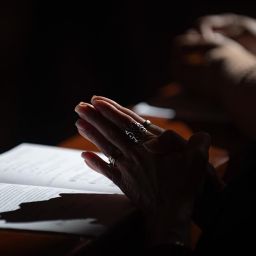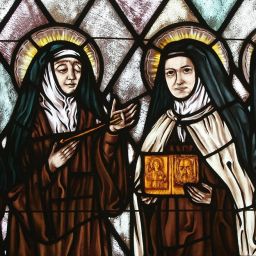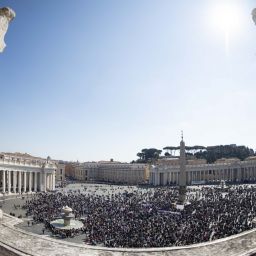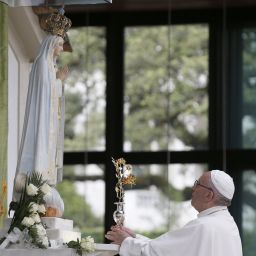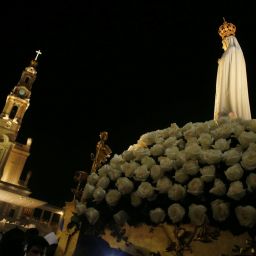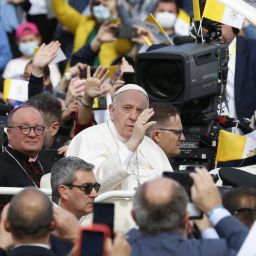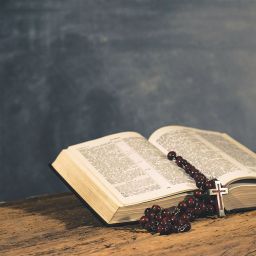
By Carol Glatz
Catholic News Service
AWALI, Bahrain — Bahrain’s National Stadium became an oasis of multiple cultures, languages, nationalities and backstories, all united by their Catholic faith and to celebrate Mass with Pope Francis.
“This very land is a living image of coexistence in diversity, and indeed an image of our world, increasingly marked by the constant migration of peoples and by a pluralism of ideas, customs and traditions,” the pope said in his homily Nov. 5.
Thousands of people from all over the world who live and work in Bahrain, Kuwait, Qatar, Saudi Arabia and other Persian Gulf countries came by bus or car to the huge stadium in Awali for the Mass.
“Raised a Catholic, this is an opportunity of a lifetime,” said Leana Mapie.
The pope’s visit is important not only for local Catholics but is also “a huge step for the Middle East,” she said. “Building a foundation with other cultures is the right direction.”
Mapie, originally from California, and her husband Alec Dahlquist, originally from Idaho, have been stationed at the U.S. Navy base in the Kingdom of Bahrain for the past three months and have another few more months to go, they told Catholic News Service.
“It’s cool to see all the different religions and cultures come together” throughout Bahrain, which is tremendously diverse, Dahlquist said.
Bahrain’s National Communication Center said people from 111 countries were present for the Mass.
A Muslim-majority nation, Bahrain has a population of around 1.5 million people, about half of whom are foreign workers from all over the world. About 9% are Christian and others come from the Hindu, Buddhist and Jewish faiths. The church estimates there are about 80,000 Catholics in Bahrain and a total of 2.5 million Catholics throughout the Gulf region.
Nishma Pereira and her husband Jaison Sequeira are from Mangalore, India, and have been living in Bahrain for four years. They are active members of Manama’s Sacred Heart Church, which was inaugurated in 1939 and where the pope is scheduled to go Nov. 6, his last day in Bahrain.
“We are blessed. It’s the first time for us to see the pope,” Pereira said.
The pope “is a man of peace for governments, people, everyone. He spreads peace,” Sequeira said.
The stadium, which seats 28,000 people, erupted with joy when the pope emerged, standing in the popemobile.
The speaker on stage said history was unfolding before their eyes: “God bless the Kingdom of Bahrain, God bless the king, God bless the royal family, God bless every one of us. Praise God,” said the unidentified speaker. It was the first time a pope had visited this Gulf nation.
Tears came to Jinson Puthussesy’s eyes as the pope passed right in front of him. From Kerala, India, he has been in Bahrain for 10 years, runs a small business and belongs to the Sacred Heart parish.
“I am very happy. This is a once-in-a-lifetime chance,” he told CNS, in awe that he had been invited to move from a seating section out of view of the altar to a VIP area to see the pope up close.
Pope Francis thanked all those present for their “gentle and joyful witness to fraternity, for your being seeds of love and peace in this land.”
“If we want to be children of the Father and build a world of brothers and sisters, the real challenge is to learn how to love everyone, even our enemies,” he told the crowd.
Jesus tells his disciples to find the courage to take the risk of overcoming evil with good, he said.
Jesus does not want people “to dream idealistically of a world of fraternity, but to choose, starting with ourselves, to practice universal fraternity, concretely and courageously, persevering in good even when evil is done to us, breaking the spiral of vengeance, disarming violence, demilitarizing the heart,” Pope Francis said.
It is not easy to “love always” like Christ, and he knows people struggle with relationships and within their own heart, the pope said. “He also knows that, for all our generous efforts, we do not always receive the good we expect and indeed sometimes, incomprehensibly, we suffer evil.”
Jesus, too, suffers “when he sees in our own day and in many parts of the world, ways of exercising power that feed on oppression and violence, seeking to expand their own space by restricting that of others, imposing their own domination and restricting basic freedoms, and in this way oppressing the weak,” the pope said.
“The power of Jesus is love,” he said. “Jesus gives us the power to love in this way,” which is a grace that must be “implored insistently: ‘Jesus, you who love me, teach me to love like you. Jesus, you who forgive me, teach me to forgive like you.'”
At the end of Mass, Bishop Paul Hinder, administrator of the Apostolic Vicariate of Northern Arabia, thanked the pope for his “pastoral care for a tiny church in a tiny country.”
“Like your patron St. Francis of Assisi, you are not afraid to build bridges with the Muslim world and to show your fraternal closeness to all people of goodwill,” said the bishop, who is a Capuchin Franciscan.
“We Christians in the Middle East,” he said, “try to implement the invitation of St. Francis to his brothers to ‘live spiritually among the Muslims … not to engage in arguments and (simply) to acknowledge that (we) are Christians.'”

